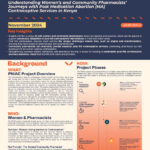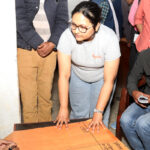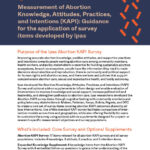
These learning briefs – a project anchor brief, a user-focused brief, and a pharmacist-focused brief – summarize lessons learned by the PMAC project during multiple phases of the project.

Khusbu Poudel, Ipas Nepal’s program coordinator for climate justice, gender, and sexual and reproductive health and rights, didn’t fully grasp the extent to which women’s and girls’ bodily autonomy is affected during climate crises until she joined Ipas two years ago.

In the heart of Kenya, from the bustling urban center of Kiambu to the rural landscapes of Kakamega, a quiet revolution in the delivery of medical abortion services is taking place through the Medical Abortion Self Use (MASU) project.

Sexual violence is a cross-border crisis that deeply impacts the lives of women and girls in Latin America. Bolivia faces one of the highest rates of sexual violence in the region.
“The current election in the U.S. is one of the most critical elections for the future of women’s rights, sexual and reproductive rights, and the right to safe and legal abortion,” says Dr. Jean-Claude Mulunda, Director of Ipas Democratic Republic of Congo. “The toughening of laws that began with the Dobbs decision set a detrimental direction; and this election will decide the fate of women in the U.S. and worldwide.”

The Abortion Knowledge, Attitudes, Practices, and Intentions (KAPI) Survey with optional add-on supplements, developed by Ipas, is a comprehensive resource designed to assess and enhance community understanding, attitudes and support around abortion care.

